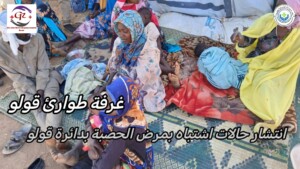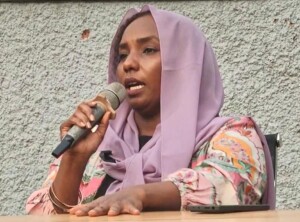Sudan school year postponed until COVID-19 precautions are in place
Acting Minister of Health, Osama Abdelrahim, ruled out a second lockdown on Thursday, meanwhile the Higher Committee for Health Emergencies decided to postpone the opening of schools until further notice.
 Secondary school students practice social distancing in class (social media)
Secondary school students practice social distancing in class (social media)
Acting Minister of Health, Osama Abdelrahim, ruled out a second lockdown on Thursday, meanwhile the High Committee for Health Emergencies decided to postpone the opening of schools until further notice.
The decision to keep schools closed was made during a committee meeting at the Republican Palace, to guarantee that health precautions are implemented by the educational institutions and logistics are in place to create a safe and healthy school environment.
The Sudanese Ministry of Health reported yesterday 231 new COVID-19 cases as of November 18, six deaths, and 12 recoveries.
This brings the total number of cases since the start of the pandemic to 15,530 cases.
Khartoum state recorded 203 new cases, Red Sea state 16, El Gezira six, White Nile state two, Sennar two, and Blue Nile state one. The official death toll is listed as 1,185, however, doctors say “the real number of cases is much greater”.
The current trend in number of cases rules out the need for a second lockdown according to the acting Minister of Health, who is currently working from home after contracting coronavirus two weeks ago. His press statement on Thursday called for “speedy solutions” to funding for medical and PPE supplies, a lack of which “is considered one of the major issues facing the health system.”
He also called for further preparation of isolation wards, which are suffering from severe shortages in PPE and qualified medical personnel. Last week, Radio Dabanga reported that isolation wards of the Khartoum Teaching Hospital and El Shaab Hospital are full.
There are almost no isolation centres equipped to receive coronavirus patients throughout the rest of Sudan, according to the Socialist Doctors Association.
The minister stressed the necessity for being committed to safety precautions, including wearing masks, banning mass gatherings, and raising health awareness. On the same day, the Council of Ministers held a meeting chaired by Prime Minister Abdallah Hamdok to give directives for intensification of a media awareness campaign on the second wave of the coronavirus pandemic.
Education grant
The World Bank has approved a $61.5 million grant toward reforming Sudan’s education system as part of the country’s biggest education financing project, according to the bank’s statement on Wednesday.
The grant will aim to “introduce reforms in the education sector which are aligned with the goals of the Government Education Sector Strategic Plan, particularly for improved education service delivery,” said Milena Petrova Stefanova, World Bank Country Manager for Sudan.
The Sudanese education minister welcomed the support of the World Bank. “The Project will certainly take us a good way towards the achievement of the Sustainable Development Goals in Education (SDG 4); namely good quality education, and free, inclusive and equitable education,” said Mohamed El Amin El Tom, Minister of Education.
The grant, funded by the Global Partnership for Education, includes a project which will support the improvement of public schools by cutting down tuition, purchasing educational equipment, and increasing sanitation. The funding will focus specifically on schools in underprivileged areas.
The project will also aim to strengthen primary schools’ current operations amid disruptions and closures resulting from the COVID-19 pandemic.
Disruption to schools
Schools were first closed after protests against the regime of Omar Al Bashir, that started at the end of 2018, spread throughout Sudan in January the following year. They have remained closed, off and on, until now. Final exams students of the basic and secondary schools were allowed to do their examinations, respectively in March and in September this year.
Many children have not had lessons for almost two years.
The start of the new school year scheduled for September 27 this year, was postponed to November 22, because of the record Nile floods, as well as the shortage of furniture and textbooks.
Radio Dabanga’s editorial independence means that we can continue to provide factual updates about political developments to Sudanese and international actors, educate people about how to avoid outbreaks of infectious diseases, and provide a window to the world for those in all corners of Sudan. Support Radio Dabanga for as little as €2.50, the equivalent of a cup of coffee.












 and then
and then